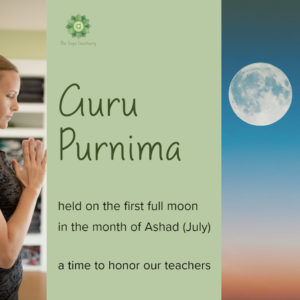Teacher Appreciation Day
By Gwen Burdick
“Everything in the world has come out of one Divine Being, the sacred fire. The sages are the direct manifestation of that fire. No one understands them. No one talks to them. No one walks with them. They live in their own world and yet, driven by intense compassion, they descend and walk among human beings. They are kind and ever-engaged in guiding those who are in search of the Divine Experience. When you have a real desire to see them, they come to you in the flesh. Don’t waste your time running here and there: they are always with you; they are your real companions.” – Swami Rama as quoted by Pandit Rajmani Tigunait in At the Eleventh Hour
Guru Purnima, the highest holiday in the Vedic tradition, is celebrated yearly on the first full moon after the summer solstice in the month of Ashad, usually our July, and corresponds to the beginning of the rainy season. The Sanskrit word Guru means remover of darkness and Purnima is the full moon day of the lunation cycle. On this day scholars, academics and students from a variety of spiritual lineages gather in fellowship, known as satsang, to honor and express gratitude for the wisdom teachings and past and present teachers that have inspired, guided, and protected everyone. All forms of worship are said to be a thousand times more powerful on Guru Purnima.
Yoga and its sister Vedic sciences have been taught to sincere seekers by authentic teachers for thousands of years, one-on-one, in an unbroken fashion as an oral tradition. Saints and sages have lived throughout history, coming to teach the same message to diverse people, speaking diverse languages, and teaching in diverse ways. Considered by many to be the most necessary part of life and the greatest gift, the Sat Guru, or Enlightened Master, is the embodiment of the three Gods of the Universe: Lord Brahma the Creator, Lord Vishnu the Sustainer and Lord Shiva the Destroyer. Further, the Guru principle is available to us through the written word of the sacred texts, as the ancient seers stored this wisdom in the language of various scriptures. It is the hope that, through God’s grace, the lamp of knowledge is lit within each of us, the darkness of ignorance is removed, and that we may have a direct personal experience of our own Divinity.
Traditional ceremonies and festivities on Guru Purnima normally include kirtan (chanting), havan (a fire ceremony where prayers are offered) and prasad (a food offering, usually kheer, a sweet rice pudding). On this important day, disciples not only recommit to their own spiritual path, but brother and sister-disciples recommit to each other as well in solidarity on their spiritual journeys.

